 Following a recent court-approved agreement entered between the state of Texas and challengers to its unlawful Photo ID voting restriction, the plaintiffs are now back in court after state Republicans, including the state's Attorney General, appear to be skirting the remedies they had previously agreed to.
Following a recent court-approved agreement entered between the state of Texas and challengers to its unlawful Photo ID voting restriction, the plaintiffs are now back in court after state Republicans, including the state's Attorney General, appear to be skirting the remedies they had previously agreed to.
Both the U.S. Department of Justice (DoJ) and the private plaintiffs in Veasey v. Abbott are now seeking emergency relief to prevent the state from utilizing a deceptive scheme that plaintiffs believe will serve to intimidate and disenfranchise voters despite the court-ordered remedies agreed to by all parties just weeks ago.
The remedies, which promised to restore voting rights to hundreds of thousands of Texans this November, were an encouraging sign for voting rights advocates. The outlook for the Presidential Election was suddenly much brighter for Lone Star State voters. At least until now.
Two separate motions, one filed by the DoJ and the other by the private Veasey plaintiffs, allege that Texas Republicans, including the state's Attorney General Ken Paxton, have resorted to deception and intimidation in what appears to be a bad faith effort to prevent or at least discourage those who lack state-approved photo IDs from casting a regular vote on November 8. Both motions seek emergency relief from the District Court, but stop short of what may be an appropriate request that the AG be ordered to show cause as to why he should not be held in contempt of court...
"Can't reasonably obtain" doesn't mean "can't obtain"
On July 20, the full 5th Circuit Court of Appeal --- the most conservative federal appellate court in the nation --- upheld a finding by U.S. District Court Judge Nelva Gonzales Ramos that the State's strict polling place Photo ID restriction, SB 14, violated the provisions of Section 2 of the federal Voting Rights Act (VRA) because of its disparate adverse impact on minority voting rights. The matter was remanded to the District Court for further proceedings including the issuance of an interim order that would, in essence, prevent the unlawful disenfranchisement of more than 600,000 legally registered (and Democratic-leaning) Texas voters who lack one of the narrow range of state-approved photo IDs under the statute.
On August 10 Judge Gonzales Ramos issued an order in which she approved interim remedies pursuant to an agreement of the parties. As we previously reported, the attorneys representing the DoJ and private plaintiffs drafted a meticulous set of remedies that, if complied with, would prevent further disenfranchisement during the 2016 election cycle. Lawfully registered voters, according to the agreement, could cast a regular ballot if they signed a "reasonable impediment declaration." As specifically stated in the agreed upon remedy, election officials could neither question nor challenge any voter's right to do so.
The central feature of the court-approved agreement is the specific provision compelling Texas to inform voters who lack the requisite photo IDs of the procedure by which they can, nevertheless, cast a regular ballot...
The remedy also required an education campaign by the state of Texas, to inform voters about the new requirements. An English version of the "reasonable impediment declaration" was attached to the court order, making it a simple matter for voters to present one of the aforementioned documents and sign the declaration, no questions asked, in order to cast a regular ballot.
In its emergency motion, however, the DoJ observes:
"The Fifth Circuit," the DoJ notes, "decisively rejected the State's claim that only voters who 'cannot obtain' required documents are injured by strict voter identification requirements and held that SB 14 abridged the voting rights of individual plaintiffs who faced 'excessive burdens' or 'a substantial obstacle to voting'."
Not just a theoretical concern
The distinction between "cannot obtain" and "cannot reasonably obtain" is especially poignant in Texas.
Consider the unanimous finding made by a three-judge U.S. District Court in Washington D.C. when, in 2012, it refused to grant pre-clearance for SB 14 under Section 5 of the VRA. While there were a number of factors that underscored the nature of undue burdens, none was more prominent than the distances otherwise lawfully registered voters may have to travel to their nearest Department of Public Safety (DPS) office in order to secure a supposedly "free" photo ID...
This is not just a theoretical concern, especially when applied to voters who have neither a car nor a driver's license.
In his coverage of Texas' attempt to undermine the court-approved agreement, Ian Millhiser of ThinkProgress cites this maddening, real world example:
Each time Kennie made this trip, he was told that he lacked paperwork he was required to present in order to obtain an ID. Eventually, he gave up after he was refused an ID because his birth certificate listed his last name as “Caruthers,” his mother’s maiden name, not "Kennie," the name of his father.
But was it really impossible for Kennie to obtain an ID? Could Kennie comply with Texas' "cannot obtain" standard, rather than the court order’s less rigid "cannot reasonably obtain" standard?
It is far from clear that it was literally impossible for Kennie to obtain ID. He could have attempted to hire legal counsel and pursued his voting rights that way. Or he could have accepted that his legal name is now "Eric Caruthers," a step he refused to take because he viewed it as an insult to his father. Or perhaps he could have attempted to legally change his name to "Kennie," the name he has always used, and then take another multi-hour trip attempting to obtain ID once again.
Texas' "cannot obtain" standard suggests that he is required to jump through these hoops if he wishes to vote. But that is not what the court order said.
Intimidation = Illegal 'Challenge'?
The court approved stipulations expressly prohibited both election officials and poll watchers from either questioning or challenging "voters concerning the voter's lack of SB 14 ID and the voter's claimed impediment...prior to allowing the voter to cast a regular ballot with a reasonable impediment declaration."
Nonetheless, according to an August 26 Houston Press article (appended as Exhibit "A" to the private plaintiffs' motion), Harris County Clerk Stan Stanart said he'd "investigate everyone who signs that form to assure they are not lying." Stanart, according to the newspaper's account, said that after votes were counted, his office would check the names on the declarations against the DPS database to see if the individuals had previously received IDs.
Stanart's intimidating remarks were piled atop those of Republican Texas Attorney General Ken Paxton, who, according to an August 22 memo from attorney Ezra Rosenberg of the Lawyers' Committee for Civil Rights Under Law (Exhibit "B" to the private plaintiffs' motion), told Fox "News" that he, Paxton, would "use the Declaration of Reasonable Impediment as a basis for perjury prosecutions."
In other words, despite an express provisions of the court ordered remedies that prevented election officials from doing so, Stanart and Paxton, in advance of the election, issued a blanket "challenge" to every "voter concerning the voter's lack of SB 14 ID and the voter's claimed impediment."
In his memo, Rosenberg stressed that the interim order was designed to prevent voter intimidation.
To cast the shadow of criminal prosecutions of voters signing the Declaration onto this process, where studies have shown that voters can often be mistaken or uncertain as to whether they do not have required ID, is contrary to the over-arching purpose of the interim relief order. The State is obliged to take all steps to ensure that those discriminated against by SB 14 vote, not that they be scared away from voting.
In their motion, the private plaintiffs observed that when they expressed concerns that Stanart's remarks were designed to "intimidate voters and chill participation in the November election," the State "Defendants flatly refused to inquire whether Mr. Stanart made these remarks, and took the troubling position that they have no responsibility for the actions of Texas county and local election officials, including Mr. Stanart --- the chief election officer of the largest county in the state, with more than 2 million voters --- even when they are implementing this Court's Interim Remedial Order."
Additional remedies sought
In their motions, the DoJ and the private plaintiffs asked Judge Gonzales Ramos to order the State to issue corrections in all of its electronic resources, educational and poll worker materials, and past press releases and public statements so as to assure that voters are fully informed about their right to vote via a "reasonable impediment declaration."
In a separate motion, the private plaintiffs also sought orders that would clarify the purpose of the Declaration of Reasonable Impediment and that "the fact that a database may show that a voter was once issued an SB14 ID does not, by itself, prove that the voter did not have a good faith belief that the voter did not possess SB 14 ID, at the time of executing the Declaration of Reasonable Impediment." They also asked that the State be ordered to educate not only voters but "every county’s election officials, county district attorneys, and members of the Office of the Attorney General" about what is mandated by the court's previous remedial order.
Frankly, when it comes to Attorney General Paxton --- a man who is himself under indictment for multiple felony counts of alleged securities fraud --- neither the DoJ nor the private plaintiffs have gone far enough. Paxton's office directly participated in these proceedings. Indeed, his office signed off on the Joint Motion for Entry of Temporary Remedial Order, which expressly set forth the proscription against either questioning or challenging "voters concerning the voter's lack of SB 14 ID and the voter's claimed impediment to obtaining SB 14 ID prior to allowing a voter to cast a regular ballot with a reasonable impediment declaration."
By issuing, in advance of the election, a threat "to use the Declaration of Reasonable Impediment as a basis for perjury prosecutions," Paxton, in a direct and contemptuous violation of the court's order, issued a "challenge" to every voter who seeks to rely upon these new court approved procedures. In this author's opinion, the appropriate remedies should thus include an order that Paxton personally appear before Judge Gonzales Ramos and show cause, if any there be, why he should not be held in contempt.
UPDATE: U.S. District Court Judge Nelva Gonzales Ramos issued a one-paragraph order in which she scheduled a hearing on the plaintiffs' emergency motions for "Monday, September 19, 2016 at 5:00 p.m."
Ernest A. Canning is a retired attorney, author, Vietnam Veteran (4th Infantry, Central Highlands 1968) and a Senior Advisor to Veterans For Bernie. He has been a member of the California state bar since 1977. In addition to a juris doctor, he has received both undergraduate and graduate degrees in political science. Follow him on twitter: @cann4ing


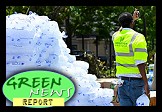 'Green News Report' 7/11/24
'Green News Report' 7/11/24
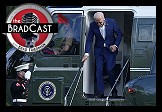 Paging 'Johnny Unbeatable'! Dems in Disarray! (But Really This Time): 'BradCast' 7/10/24
Paging 'Johnny Unbeatable'! Dems in Disarray! (But Really This Time): 'BradCast' 7/10/24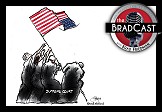 SCOTUS Immunity Ruling 'As Bad as it Sounds', Arguably Worse: 'BradCast' 7/9/24
SCOTUS Immunity Ruling 'As Bad as it Sounds', Arguably Worse: 'BradCast' 7/9/24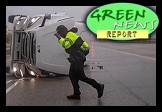 'Green News Report' 7/9/24
'Green News Report' 7/9/24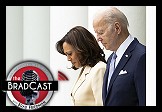 So, What Now?:
So, What Now?: Overdue Debunking of MAGA Cult Xenophobia
Overdue Debunking of MAGA Cult Xenophobia Sunday 'Courting Disaster' Toons
Sunday 'Courting Disaster' Toons Sunday 'Bad Medicine' Toons
Sunday 'Bad Medicine' Toons A Friendly Suggestion:
A Friendly Suggestion: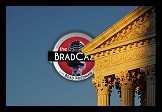 Former Fed Prosecutor: SCOTUS Corruption Ruling Less Corrupt Than Appears: 'BradCast' 6/27/24
Former Fed Prosecutor: SCOTUS Corruption Ruling Less Corrupt Than Appears: 'BradCast' 6/27/24 'Green News Report' 6/27/24
'Green News Report' 6/27/24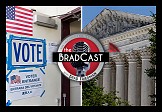 Good News and Bad: At the Polls and From the Corrupted Court: 'BradCast' 6/26/24
Good News and Bad: At the Polls and From the Corrupted Court: 'BradCast' 6/26/24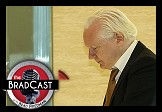 'Not Something Journalists Do': A NatSec Journo on Assange Hacking, Plea Deal: 'BradCast' 6/25/24
'Not Something Journalists Do': A NatSec Journo on Assange Hacking, Plea Deal: 'BradCast' 6/25/24 'Green News Report' 6/25/24
'Green News Report' 6/25/24 Fox 'News' Grooming Viewers for Another Insurrection: 'BradCast' 6/24/24
Fox 'News' Grooming Viewers for Another Insurrection: 'BradCast' 6/24/24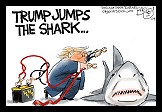 Sunday 'Shark Jumping' Toons
Sunday 'Shark Jumping' Toons The Prophecy and Warning of the White Buffalo: 'BradCast' 6/20/24
The Prophecy and Warning of the White Buffalo: 'BradCast' 6/20/24 'Green News Report' 6/20/24
'Green News Report' 6/20/24 CA Biz Group, WSJ 'Fabricate' $20/hr Fast Food Wage Stats: 'BradCast' 6/19/24
CA Biz Group, WSJ 'Fabricate' $20/hr Fast Food Wage Stats: 'BradCast' 6/19/24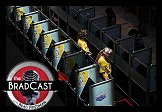 Interference Threats Loom Over November's Presidential Election: 'BradCast' 6/18/24
Interference Threats Loom Over November's Presidential Election: 'BradCast' 6/18/24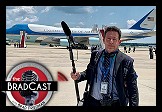 Inside White House Press Corps During Trump/COVID Era: 'BradCast' 6/17/24
Inside White House Press Corps During Trump/COVID Era: 'BradCast' 6/17/24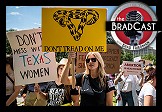 The Corrupt Anti-Abortion TX-to-SCOTUS Legal Mill Pipeline: 'BradCast' 6/13/24
The Corrupt Anti-Abortion TX-to-SCOTUS Legal Mill Pipeline: 'BradCast' 6/13/24 Hunter Conviction; Trump's Weaponized Ignorance: 'BradCast' 6/11/24
Hunter Conviction; Trump's Weaponized Ignorance: 'BradCast' 6/11/24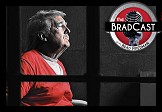 After Trump Verdict, GOPers Suddenly Warm to Voting for Felons: 'BradCast' 6/10/24
After Trump Verdict, GOPers Suddenly Warm to Voting for Felons: 'BradCast' 6/10/24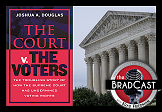 SCOTUS Has Been Undermining American Democracy for 50 Yrs: 'BradCast' 6/6/24
SCOTUS Has Been Undermining American Democracy for 50 Yrs: 'BradCast' 6/6/24 What Happens in Texas Does NOT Stay in Texas: 'BradCast' 6/5/24
What Happens in Texas Does NOT Stay in Texas: 'BradCast' 6/5/24
 VA GOP VOTER REG FRAUDSTER OFF HOOK
VA GOP VOTER REG FRAUDSTER OFF HOOK Criminal GOP Voter Registration Fraud Probe Expanding in VA
Criminal GOP Voter Registration Fraud Probe Expanding in VA DOJ PROBE SOUGHT AFTER VA ARREST
DOJ PROBE SOUGHT AFTER VA ARREST Arrest in VA: GOP Voter Reg Scandal Widens
Arrest in VA: GOP Voter Reg Scandal Widens ALL TOGETHER: ROVE, SPROUL, KOCHS, RNC
ALL TOGETHER: ROVE, SPROUL, KOCHS, RNC LATimes: RNC's 'Fired' Sproul Working for Repubs in 'as Many as 30 States'
LATimes: RNC's 'Fired' Sproul Working for Repubs in 'as Many as 30 States' 'Fired' Sproul Group 'Cloned', Still Working for Republicans in At Least 10 States
'Fired' Sproul Group 'Cloned', Still Working for Republicans in At Least 10 States FINALLY: FOX ON GOP REG FRAUD SCANDAL
FINALLY: FOX ON GOP REG FRAUD SCANDAL COLORADO FOLLOWS FLORIDA WITH GOP CRIMINAL INVESTIGATION
COLORADO FOLLOWS FLORIDA WITH GOP CRIMINAL INVESTIGATION CRIMINAL PROBE LAUNCHED INTO GOP VOTER REGISTRATION FRAUD SCANDAL IN FL
CRIMINAL PROBE LAUNCHED INTO GOP VOTER REGISTRATION FRAUD SCANDAL IN FL Brad Breaks PA Photo ID & GOP Registration Fraud Scandal News on Hartmann TV
Brad Breaks PA Photo ID & GOP Registration Fraud Scandal News on Hartmann TV  CAUGHT ON TAPE: COORDINATED NATIONWIDE GOP VOTER REG SCAM
CAUGHT ON TAPE: COORDINATED NATIONWIDE GOP VOTER REG SCAM CRIMINAL ELECTION FRAUD COMPLAINT FILED AGAINST GOP 'FRAUD' FIRM
CRIMINAL ELECTION FRAUD COMPLAINT FILED AGAINST GOP 'FRAUD' FIRM RICK SCOTT GETS ROLLED IN GOP REGISTRATION FRAUD SCANDAL
RICK SCOTT GETS ROLLED IN GOP REGISTRATION FRAUD SCANDAL VIDEO: Brad Breaks GOP Reg Fraud Scandal on Hartmann TV
VIDEO: Brad Breaks GOP Reg Fraud Scandal on Hartmann TV RNC FIRES NATIONAL VOTER REGISTRATION FIRM FOR FRAUD
RNC FIRES NATIONAL VOTER REGISTRATION FIRM FOR FRAUD EXCLUSIVE: Intvw w/ FL Official Who First Discovered GOP Reg Fraud
EXCLUSIVE: Intvw w/ FL Official Who First Discovered GOP Reg Fraud GOP REGISTRATION FRAUD FOUND IN FL
GOP REGISTRATION FRAUD FOUND IN FL


































